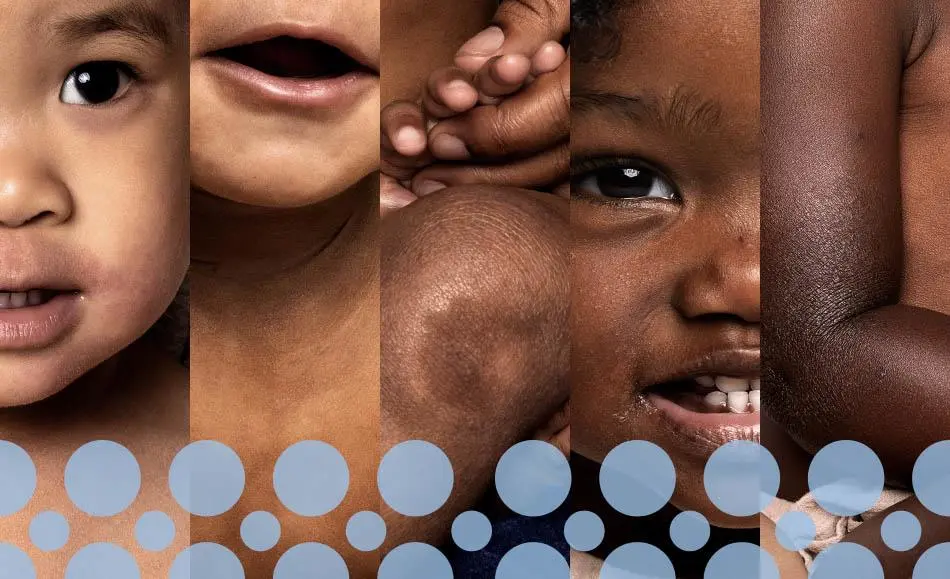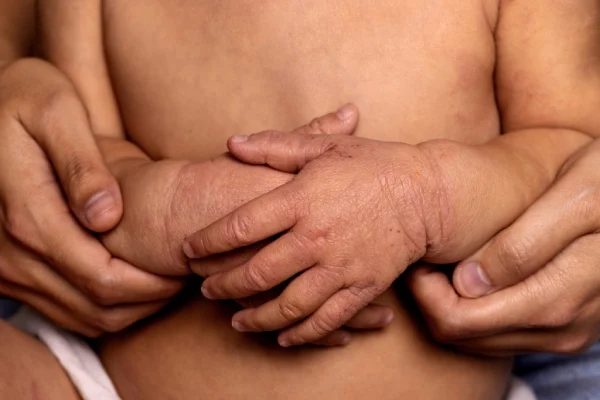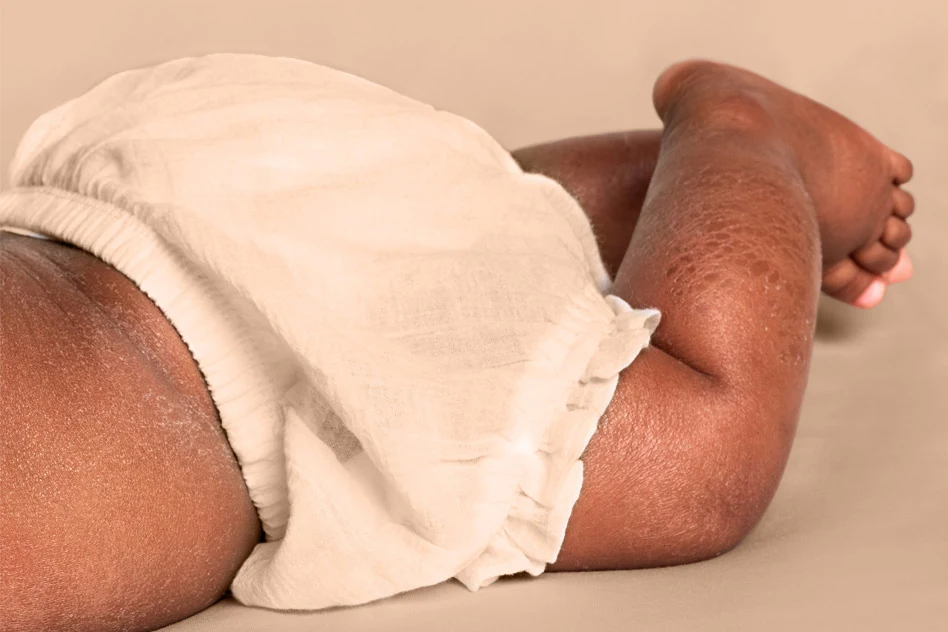WHAT IS BABY ECZEMA?

Eczema is a skin condition that usually appears as an itchy, red patch on the hands, feet, backs of elbows and around knees, ankles and wrists. It also may affect a baby’s cheeks, chin, chest, forehead or scalp. Eczema can appear in other areas too, though not usually the diaper area where moisture acts as a barrier. Dry skin, sweating, pet dander or even dust can cause a flare-up of your child’s eczema. Scratching also can make eczema worse, causing redness, swelling and other symptoms like itching. Though its cause isn’t completely understood, 10 to 15% of Canadian children under 5 are affected by eczema.[3] If you have a family history of eczema, asthma or hay fever, your baby may be more likely to develop it. Adult eczema may not look the same on a child, which is why identifying symptoms and triggers is important to protect your baby’s skin. Though there is no cure, a daily skin care routine including regular bathing and moisturizing with a clinically proven solution like AVEENO® Eczema Care is essential to care for your baby’s eczema.

ECZEMA EQUALITY
Eczema appears quite differently on different skin tones. We saw when parents searched for images, the results were almost all Caucasian babies. Visit our resource library to see how we created eczema representation on every baby’s skin tone.
BABY ECZEMA TRIGGERS
IRRITANTS
Many soaps, disinfectants and fragrances can make eczema worse for baby’s skin. Common products that may cause a flare-up include: detergents and dryer sheets; bubble bath and some shampoos; disinfectants like chlorine; dyes, and coarse fabrics like wool. Always wash new clothes before they are worn, use dye-free and fragrance-free detergents, and choose sunscreen made for sensitive skin.
ALLERGENS
Typical allergens like dust mites, pet dander, pollen and mold can cause itchy, inflamed skin. Make your home an allergy-free zone by vacuuming and wet-dusting frequently, keeping soft toys (which trap dust) to a minimum and washing them often, and grooming pets regularly.
ENVIRONMENT
Extremes in temperature and humidity may trigger an eczema flare-up. Environmental triggers include very hot or very cold temperatures, high or low humidity, cigarette smoke and pollution. Keep the baby’s bedroom between 20 and 22°C and maintain even humidity in your home.
FOOD
It’s relatively rare in infants, but 1 in 10 children with eczema experience symptoms caused by food allergies.[4] In general, children under age 5 with severe eczema also may have a food allergy, most commonly triggered by milk, eggs, nuts, seeds or wheat.
STRESS
While stress doesn’t cause eczema, symptoms may worsen as the result of tension, anger or frustration. If your child is having problems at daycare, you may notice more eczema flare-ups than usual. Stress also can cause habit scratching, which perpetuates the itch-scratch cycle. In that case, keep your child’s fingernails short and consider cotton gloves or mittens if your child tends to scratch while sleeping.

ECZEMA ITCH-SCRATCH CYCLE
Unfortunately, the more babies scratch, the more likely they are to perpetuate or even worsen the itching, redness, and swelling. This is referred to as the “itch-scratch” cycle and it can be very painful. More often than not, eczema will go away as your baby grows older. Treatment at the onset can stop eczema in its tracks, which is why daily skin care like bathing and moisturizing is essential. An effective and scientifically proven skin care routine like AVEENO® Baby Eczema Care can help strengthen the skin’s moisture barrier and prevent the recurrence of itchy, dry, irritated and uncomfortable skin.
ECZEMA CARE: BATHING AND MOISTURIZING
It can be very challenging to care for a baby who is uncomfortable because of an eczema flare-up. So, following a daily skincare routine of bathing and moisturizing is key to keeping baby’s sensitive or eczema-prone skin under control. Mild cleansing can help the skin absorb topical therapies, which keeps the barrier intact and helps prevent flare-ups. Moisturizers trap water in the skin, which makes it more flexible and less likely to crack. It’s important to moisturize regularly, even when your child does not have a flare-up because dry skin is a frequent cause of eczema.
BATHING TIPS
Use lukewarm water to wash your child.
Use a mild, non-drying, fragrance-free cleanser such as AVEENO® Baby Eczema Care Wash.
Gently pat skin dry — don't rub.
Avoid body sponges and washcloths.
MOISTURIZING TIPS
Apply moisturizer, such as AVEENO® Baby Eczema Care Moisturizing Cream, to damp skin (within 3 minutes after the bath).
Before bedtime, apply AVEENO® Baby Eczema Care Nighttime Balm to leave baby’s skin feeling soothed.
Apply prescribed medications first and then liberally apply moisturizer.
HOW IS ECZEMA DIFFERENT IN SKIN OF COLOUR
Eczema can look quite different on darker skin tones.
AVEENO® BABY IS HERE TO HELP
Your baby’s sensitive skin needs special care every day. AVEENO® Baby products are carefully formulated to gently comfort and prevent itchy, irritated or dry skin from eczema.
REFERENCES
[1] Based on 2021 Pediatrician Claims Tracking Study
[2] AVEENO® Baby Eczema Care Cream and Nighttime Balm
[3] Atopic Dermatitis (Eczema). Canadian Skin Patient Alliance. (n.d.). Retrieved 2022, from https://www.canadianskin.ca/atopic-dermatitis-eczema#:~:text=Atopic%20De....
[4] Eczema and Food Allergy in Babies and Young Children. HealthLink BC. (n.d.). Retrieved 2022, from https://www.healthlinkbc.ca/healthy-eating-physical-activity/age-and-sta...
